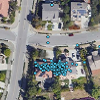Exploring the effectiveness of geomasking techniques for protecting the geoprivacy of Twitter users
Keywords:
privacy, geoprivacy, geomasking, social media, digital footprints, uncertaintyAbstract
With the ubiquitous use of location-based services, large-scale individual-level location data has been widely collected through location-awareness devices. Geoprivacy concerns arise on the issues of user identity de-anonymization and location exposure. In this work, we investigate the effectiveness of geomasking techniques for protecting the geoprivacy of active Twitter users who frequently share geotagged tweets in their home and work locations. By analyzing over 38,000 geotagged tweets of 93 active Twitter users in three U.S. cities, the two-dimensional Gaussian masking technique with proper standard deviation settings is found to be more effective to protect user's location privacy while sacrificing geospatial analytical resolution than the random perturbation masking method and the aggregation on traffic analysis zones. Furthermore, a three-dimensional theoretical framework considering privacy, analytics, and uncertainty factors simultaneously is proposed to assess geomasking techniques. Our research offers insights into geoprivacy concerns of social media users' georeferenced data sharing for future development of location-based applications and services.

Downloads
Published
Issue
Section
License
Copyright (c) 2019 Song Gao, Jinmeng Rao, Xinyi Liu, Yuhao Kang, Qunying Huang, Joseph App

This work is licensed under a Creative Commons Attribution 4.0 International License.
Articles in JOSIS are licensed under a Creative Commons Attribution 3.0 License.
